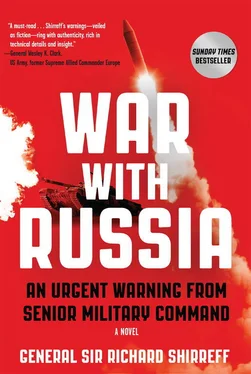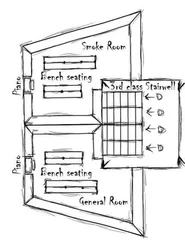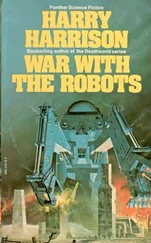The President ignored the attempt at humor and turned to Merkulov, head of the intelligence service, the FSB. “What should we expect America’s next move to be, Lavrentiy Pavlovich?”
Komarov could see Merkulov choose his words with care. After all, he was known for owing his survival and promotion both in the KGB and the FSB to his well-judged ability to think ahead and, above all, to avoid boxing himself into a corner.
“With their military losses in Latvia, America is now probably locked in, like it or not, Vladimir Vladimirovich,” he replied. “The new President, Turner Dillon, is a relatively unknown quantity, but the character picture we have been building up suggests she will be cautious about committing herself any further. Although she was very critical about Obama’s foreign policy weakness during the election campaign, the reality is that America has never regained the face lost when Obama stepped back from his so-called red line over chemical weapons in Syria, or when you checkmated him, again in Syria two years ago, by attacking American-backed rebel forces and so helped stabilize Assad’s position. That was the moment for America to show its resolve and face us down. They did nothing except complain. However, as with any unknown quantity, and as we both know from harsh experience, Vladimir Vladimirovich, Dillon may yet surprise us. She already has with her decision to send those troops to Latvia. A foolish decision, but an unexpected one nevertheless. And one, I fear, with consequences…”
The President looked troubled, but Komarov knew he was too reliant on Merkulov’s unwavering loyalty, and that of his feared FSB, to press him further. “What about NATO… Now that we’ve sunk two NATO ships?”
“On the face of it, Vladimir Vladimirovich, these sinkings are indeed unfortunate. It is now as certain as it can be that Germany will sign up to Article Five and be joined by the other wobblers, particularly France, which usually follows Germany. UK has been weak and irresolute in its foreign policy under Prime Minister Spencer for some years now, but it is likely that the sinking of a British ship will force him to present a bold front. As for Greece, it remains dependent on German support to underwrite its loans, so the Greeks probably feel obliged to follow Germany. Much as they hate it, they cannot afford not to. Nevertheless, let me reassure you. You have completely wrong-footed NATO and demonstrated conclusively the Alliance’s failure to take the necessary measures to defend the Baltic states. The simple fact is that, even if all the nations now agree on Article Five, you are in complete possession of the Baltic states. NATO can do nothing except invade and they are hardly likely to risk a general war in Europe to do that. Even if they had the forces, which they do not. You have effectively outmaneuvered them.”
Merkulov looked at the President, who nodded back for him to continue. And he did not disappoint. “The reality is that by letting us take the Baltics without intervening to stop us when they clearly had the chance, NATO has effectively ceased to exist as a military alliance. It has lost three member states and cannot recover them. NATO has been put to the test and failed.”
The President reflected for a moment and then smiled, baring his teeth. He looked around at his advisers before striking the table with his fist. This was his moment to show that he was a man of both will and destiny.
“The way ahead is clear.” He looked at his Foreign Minister. “Yevgeney Sergeyevich, you are to continue to work away at the minor nations of the Alliance to wean them away from American influence; to divide and rule, make sure they do not rediscover their balls. But at the same time, remember that there is only one principle of war which matters. And that is concentration of force. You are to make it very clear to America and NATO through your diplomatic channels that any attempt to recapture the Baltic states will be judged an attack on Russia. An attack on Russia will invite the most extreme response. Never forget, America is a bully and, like all bullies, will back off when confronted. There is only one way to deal with America… and that is to show strength.”
“Meaning?” Everyone knew precisely what the President meant, but the donnish Foreign Minister wanted to hear him say it in front of everyone.
The President looked around the room again, clearly aware of the enormity of what he had just been asked. Then, eyes cold, voice deadpan and betraying no hint of emotion or stress, he replied, “I am ready to use tactical nuclear weapons, exactly as we have practiced in all our recent exercises, in order to stop any counter-attack by NATO. What I like to call nuclear ‘de-escalation,’ because it is the surest way to get the West to step back from the brink of a nuclear exchange. And there is no way America will risk the destruction of Europe or its own cities by replying in kind.”
The room was silent. Komarov looked at the faces around the table. No one dared show any emotion, but even he, who had rehearsed this moment with the President earlier that morning, felt the sense of occasion at the President’s carefully considered words. It was one thing to integrate the use of nuclear weapons into every aspect of military doctrine. It was quite another to hear the President unambiguously risk nuclear Armageddon and the eradication of life in Europe.
“And another thing,” continued the President, “I judge that one more hard, knockout blow will force our adversaries back into their corner and leave us master of the battlefield. So, whether it is against America or another NATO nation, if the opportunity presents itself, you are to seize it. A few western deaths now will save many deaths in the future.” He turned to Gareyev, the Chief of the Russian General Staff, as he said this.
The general sat formally to attention, arms rigid by his sides, before responding. “Yes, Vladimir Vladimirovich. This is a sound military doctrine. We must seize our opportunity when we are presented with it.”
At that moment a staff officer came in, spoke quietly to Gareyev and placed a piece of paper in front of him. He read it and gave a small smile.
The President raised his eyebrows. “Tell us, Mikhail Nikolayevich…”
“Vladimir Vladimirovich, the new British super carrier, Queen Elizabeth , is preparing to leave Portsmouth. She will sail east up the English Channel with an amphibious task force. Our information is that she will be heading for the Baltic Sea. The task force is unsupported by maritime patrol aircraft and has woefully inadequate anti-submarine protection.”
The President grinned wolfishly and stood up.
“Watch them carefully and keep me updated. This may be our opportunity.”
2200 hours, Monday, May 22, 2017
Comprehensive Crisis Operations Management Center (CCOMC) SHAPE headquarters, Mons, Belgium
“ISEE THERE are no objections,” concluded NATO Secretary General Kostilek, looking round the North Atlantic Council table as he concluded yet another session called to consider the declaration of Article 5 in support of the Baltic states, the third meeting that day.
“The communiqué we have agreed activating Article Five in defense of the Baltic states will be released shortly. This has been a difficult process and I congratulate all members on the considered and statesmanlike way you have finally reached agreement, but in the face of the outrageous aggression against our Baltic states members, together with the direct attacks on the US Air Force in Latvia and the sinking of Eckernförde and Padstow , I would have expected no less. The Alliance now faces the test of conflict. While we have reached agreement on the fundamental principle of collective defense, that unity is now about to be tested as it has never been tested before. In the dark days which will no doubt lie ahead, I ask you all to remember that Alliance cohesion is the source of our strength and therefore critical to the successful resolution of this crisis. Not only will the survival of NATO depend on it, but peace in Europe will never be achieved without a strong alliance. Only if we remain resolutely united, will we liberate those member states whose sovereignty has been so brutally abused by the aggression of Russia. Our purpose is clear: the expulsion of Russia from the Baltic states.”
Читать дальше












